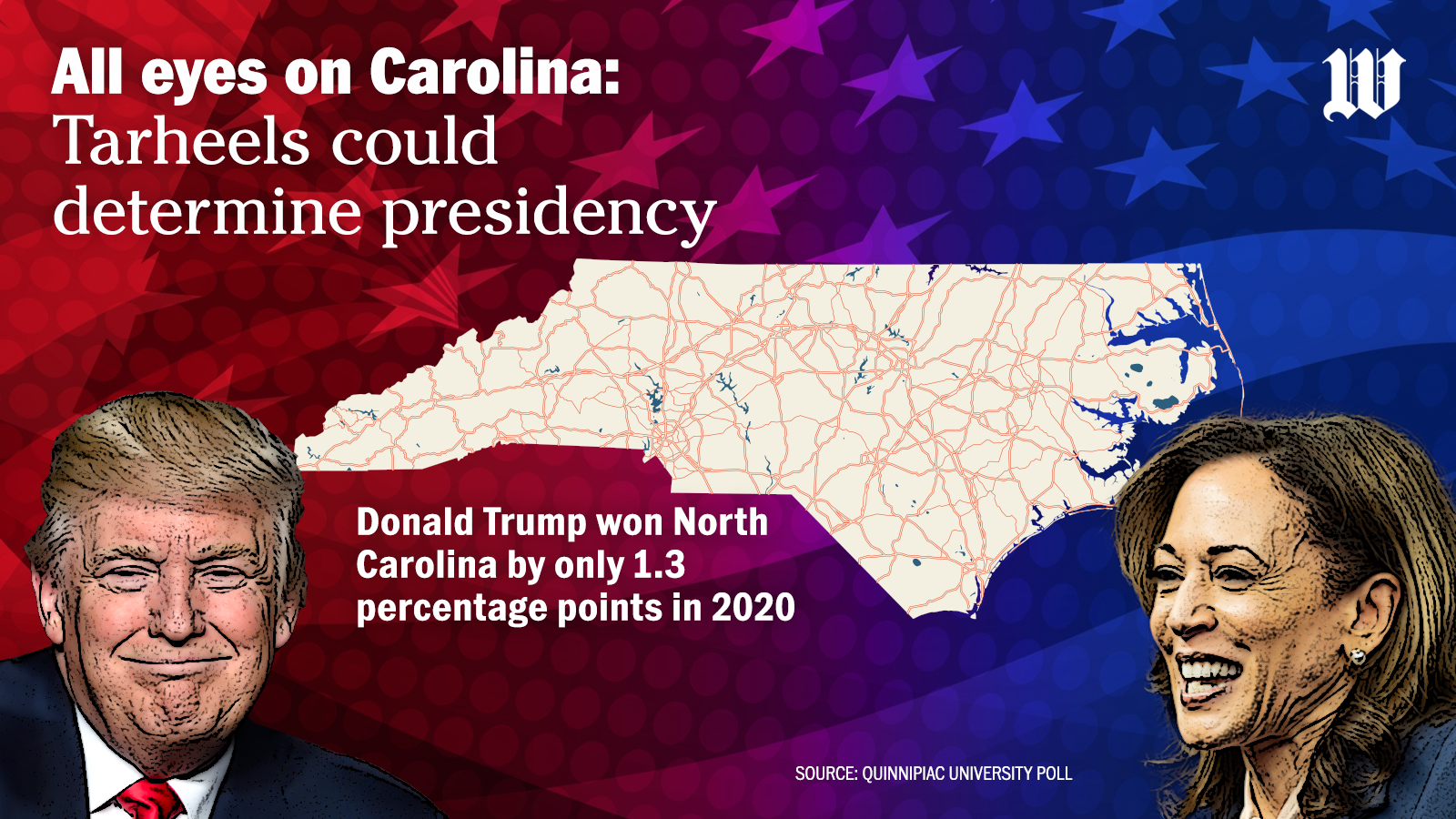Move over, Pennsylvania.
North Carolina and its 16 electoral votes could determine who enters the White House in a raucous race that’s been neck-and-neck for weeks and will come down to a handful of states.
The Tarheel State is the center of the political world right now. Vice President Kamala Harris made Charlotte her first stop after a widely praised debate performance, and former President Donald Trump is heading to Wilmington this weekend.
Ms. Harris’ running mate, Minnesota Gov. Tim Walz, will stop in Asheville on Tuesday before his GOP rival, Sen. J.D. Vance of Ohio, touches down in Raleigh on Wednesday.
Since Lyndon Johnson 60 years ago, Democratic presidential candidates have won North Carolina just twice — Jimmy Carter in 1976 and Barack Obama in 2008.
“But the state has consistently been perched on the razor’s edge that separates red and blue,” said Christopher A. Cooper, a political science professor at Western Carolina University.
Ms. Harris and Democrats are desperately trying to increase turnout among Black and young voters in the cities and suburbs to counter an impressive rural turnout machine that’s served the GOP well in recent cycles.
An early September poll from the East Carolina University Center for Survey Research found Mr. Trump leading Ms. Harris by 48% to 47%, a one-point gap that is within the poll’s three-point margin of error.
A more recent survey from Quinnipiac University poll this month had Ms. Harris leading Mr. Trump by 49% to 46%, though that three-point advantage also was within the margin of error.
Mr. Trump won North Carolina by only 1.3 percentage points in 2020, the smallest margin of any state that he won, so it is not surprising that Ms. Harris is investing in North Carolina as a consistently purple state.
Taking North Carolina away from Mr. Trump could clinch the presidency for Ms. Harris given her strong standing in the upper Midwest and other battlegrounds.
Yet Democrats have seen this movie before. The steady migration of residents from high-cost Northeastern states to North Carolina was supposed to make the state an easier lift for Democrats, only for them to see the state wiggle from their grasp in 2012, 2016 and 2020.
“North Carolina Republicans have done a phenomenal job in getting high turnout in rural areas throughout the state that has more than offset the Democratic strength in the cities and suburbs,” said Steven Greene, a political science professor at North Carolina State University.

Democrats are trying to recreate Mr. Obama’s coalition by running up the score in Mecklenburg County, which includes Charlotte, and the Research Triangle which includes Raleigh and Durham.
The last presidential election year where Democratic turnout, as measured by the percentage of the party’s registered members who actually voted, was higher than Republican turnout was in 2008.
“Harris will need that kind of mobilization effect to put her campaign over the line,” he said. “In terms of demographics, it’s about mobilizing the African American vote. The Black vote was down the last few cycles and it showed with the Democrats coming up just a bit shy.”
Ms. Harris went straight to North Carolina for a high-decibel rally following last week’s debate, underscoring the state’s importance.
“Are we going to do this, North Carolina?” she asked the crowd.
Ms. Harris held a Raleigh rally in mid-August and, all told, has visited North Carolina nine times this year. The Democratic Party has opened more than a dozen campaign offices in the state to bolster Ms. Harris and down-ballot candidates.
The Trump campaign is responding by focusing on Ms. Harris’s biggest weak spot — high costs during the Biden-Harris administration.
The GOP campaign zeroed in on out-of-control housing costs ahead of Mr. Trump’s rally in Wilmington on Saturday. The average price of a North Carolina home had risen from $240,374 to $335,760 since the Biden-Harris administration began, the campaign said, and there is a lack of affordable housing units for low-income residents.
“The Trump campaign is confident in its position in North Carolina because we have out-organized, out-registered, and outvoted Democrats in North Carolina. The people of our state know that President Trump will rebuild the economy, restore the southern border and reclaim our standing in the world,” said Matt Mercer, communications director for the state party.
Republicans say they know the race will be close but feel confident in their track record to win statewide. They pointed to support among suburban voters, rural voters and American Indian voters in the state’s Lumbee Tribe, which has swung toward Republicans.
North Carolina is also holding a governor’s race this year.
This month’s East Carolina University poll had Democrat State Attorney General Josh Stein leading Republican Lt. Gov. Mark Robinson, 47% to 41%, among likely voters in the governor’s race, with 11% undecided.
Mr. Robinson has made headlines with strident rhetoric about sexuality and culture-war issues, raising questions about whether he could hold back Mr. Trump in North Carolina.
Experts say Mr. Robinson is probably hurting only himself.
“Mark Robinson will drag himself down plenty thoroughly,” Mr. Greene said. “But I don’t think there’s much evidence that a weak gubernatorial candidate will drag down a presidential campaign in [North Carolina].”
• Tom Howell Jr. can be reached at thowell@washingtontimes.com.




Please read our comment policy before commenting.